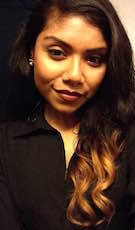The Jadeed Voices Initiative is a special project by the Muslim Writers Collective which offers a platform to reflect on our faith and the diversity among us by highlighting the exigency of promoting nuanced, multifaceted perspectives. We will be sharing one narrative a day from July 8-19. For more information about this initiative, please visit our author page, and follow the Muslim Writers Collective on Facebook and Twitter.
Ammu and I went down to the Emirates office in the Gulshan district to purchase new tickets. We had missed our flight out of Dhaka the night before. The rickshaw ride on the two-mile stretch from our flat to the main road in Khilkhet was bumpy to say the least. It was as if someone had broken and stirred bricks into mud and decided to call it a road.
Little shops lined this narrow road, packed at nearly all hours with people walking and winding their way through rickshaws, auto-rickshaws, cars, bicycles, cows, and occasional trucks. After nearly five weeks, I was still irritated by the traffic and noise and dust, but nevertheless impressed by how expertly everyone maneuvered themselves through the chaos. Even more impressive was how many of these people were fasting while going about their business in over 90 degree subtropical heat. The humid weather provided the benefit of not having to use any moisturizer all summer, but also made me sweat profusely and left me very dehydrated during the day. The hunger of fasting is never as difficult as the thirst. I was only accustomed to the Ramadans of comfortably mild Northern California summers with a consistent supply of electricity to power fans whenever needed.
Our Khilkhet rickshawallah had a light towel wrapped around his head, and sweat dripped down his face and back. His shirt looked like it had been doused in water. Weathered skin stretched over lean muscle and bones, pulling our combined weight along the broken road. I cringed at myself. It was likely that this man--along with the dozen others of his profession who could be found in each direction I turned--were fasting as well. These are the people beloved to God.
I see men walking hand in hand down the streets in Bangladesh; their sexual orientation unquestioned. Colorfully dressed hijras hopped on and off buses without paying the fare because it is unspoken knowledge to just not mess with them. Women in saris with vermilion lines of sindooram along the parting of their hair walk alongside women in saris with scarves around their heads.
This is the Bangladesh I know.
It is rose-tinted but not entirely false. Why then, the recent brutality? LGBTQ activists, Hindu priests, and secular academics have been targeted and murdered for their minority views. I heard of these attacks at home in California, far away from their source but not far removed from violence. The violence of gentrification and displacement in the Bay Area. Black lives violently cut short by officers of the law. Violent rhetoric fueling hate crimes against people who look like my family.
The Orlando shooting happened while I was in Bangladesh far away from Florida. I sat on the roof of my aunt's house and cried. At Dubai's airport on my way back home, I heard about the attack in Istanbul's airport. And then, before I could even process the news about the hostage situation in Dhaka--how I was in that very area of the city just days before, how my family is still there, how a young woman from my university was among the killed while I remained safe, how I can't go back without fearing for my life and my loved ones--before I could mourn the loss of life or rail against the media that emphasized the foreigners' lives as more worthy of coverage than the Bangladeshi ones also lost, or wonder at which one I would be classified as--Iraq experienced the deadliest attack on its civilians since the 2003 invasion.
Are you tired of this list yet?
I haven't even mentioned Syria, Sudan, or Palestine. It is Ramadan. Our community is too thirsty during the day to cry this many tears, and our nights aren't long enough for the amount of prayers we need. And we need more than prayers. If the devil is supposed to be in chains, what does that say about humanity?
This Ramadan has been strange and chaotic. The inner change and tranquility I've come to expect, constantly upset through stressful travels and global tragedies. Before we can properly grieve one tragedy, the next one arrives, bearing down until our arms can't hold onto their collective weight any longer. We are exhausted from grieving. From wondering why our blood is worth less when spilled by the same monsters.
This Eid arrives unexpected. We cannot halt our lives and live in fear, yet I am afraid to go to prayer where hundreds of my brothers and sisters in faith will congregate. I am afraid of the outline of targets on our backs, sometimes visible, sometimes faint. Are they painted there by far-right extremists or by Daesh? Both have red on their hands. I will be thinking of these things when I press my palms to the ground and lower my head in prayer. I am at a loss for what else to do with my hands. Oppression is not a machine I can dismantle, nor injustice a tree I can cut down. These hands can only hold other hands. I have only my words and my actions to show.
Farhana is a Bangladeshi-American-Muslim pursuing clinical social work in community mental health settings. She enjoys writing poetry and was a lead organizer of the Muslim Writers Collective, helping establish them in the Bay Area.
